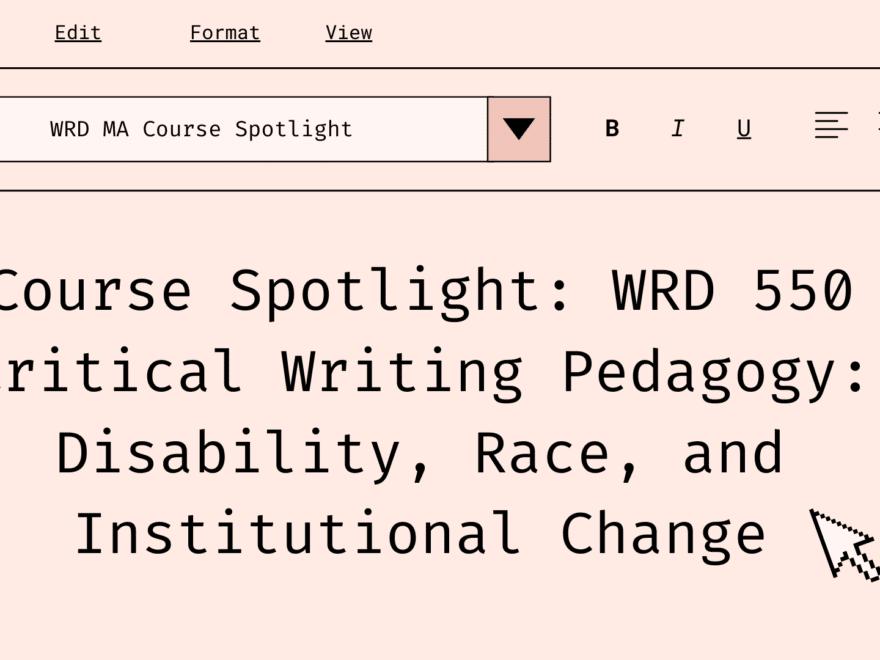Happy course registration, in its honor we are previewing some Spring’22 courses, including WRD 550. WRD 550 Critical Writing Pedagogy: Disability, Race, and Institutional Change, taught by Professor Erin Workman, aims for its students to “collectively explore the transformative potential of centering bodily diversity in our writing classrooms and writing programs.” The class will be in person on Thursdays from 6-9:15pm at the LPC.
WRD’s future teachers can take this course knowing they will be able to better expand their minds, and the futures of their potential students. We caught up with Professor Workman to get some early information on the class, the kind of work to be expected, and what the professor herself is excited to share with her students (she even recommends readings, websites, and talks that students can use to get them in the right headspace before the class!).
1. What is/are the major project/s for this course?
Because this course is focused on exploring and enacting structural, systemic, and interpersonal change through centering bodily diversity in our writing classrooms and programs, the major projects for this course will be tailored to the specific interests that students to bring to the course. For those who are already teaching writing or looking to do so soon, one major project could be (re)designing a writing course (e.g., syllabus, reading and writing assignments and activities) informed by critical embodiment pedagogies. Another option for folx who are interested in enacting institutional change might be a qualitative research project focused on an institutional location and guided by tenets of institutional ethnography or critique and critical race theory. Others may wish to further pursue lines of inquiry opened up through class discussion and activities, such as developing and analyzing a corpus of university commitments to antiracism, curating a website or blog with pedagogical resources, or creating professional development workshops for teachers. I look forward to working with students to pursue the projects that are most responsive to their learning goals.
2. Does any reading or lesson particularly excite you to teach?
Although I’m truly excited about every reading and writing assignment, I’m most looking forward to re-reading and discussing Carmen Kynard’s Vernacular Insurrections: Race, Black Protest, and the New Century in Composition-Literacy Studies, which provides a detailed historical account of the Black Freedom Movement and its impact on higher education generally and composition-literacy studies specifically, as well as reflective, practice-driven teaching interludes. I’m also looking forward to engaging with approaches to institutional critique and change—topics that were central to one of the first, and most meaningful, graduate courses I took at the MA level.
3. Should students have any expectations going in to the class or is being open-minded the way to go?
Being open-minded is definitely important! Students should also expect to have difficult and potentially uncomfortable conversations about race and disability and to be self-reflective and accountable to the group.
4. Are there any readings or current events that would help students orient themselves before class begins?
Absolutely! We’ll read and explore some of the following in the course, but if students are interested in orienting before the class, I recommend:
· Sherri Craig & Karrieann Soto Vega’s editorial introduction to Spark: A4C4Equality Journal vol. 2
· Natasha N Jones’s “The Complicity/Complexity Program of Anti-Racism Work in The Academy” from Community Literacy Journal 15.2
· Black Language Syllabus site & resources
· Anti-Ableist Composition Collective site & resources
· Christina V. Cedillo’s “What Does It Mean to Move?:Race, Disability, and Critical Embodiment Pedagogy” from Composition Forum 39
Students may also be interested in attending Sara Ahmed’s lecture, “Complaint as a Queer Method,” hosted by the Department of Gender & Social Justice at Trent University on 3/10/22. Details and registration information are available at this link: https://www.facebook.com/events/1282145758960244/
Students on the teaching track will especially benefit from this course, but all are welcome if the subject is of interest and refer to the course description or your advisor with any questions!
